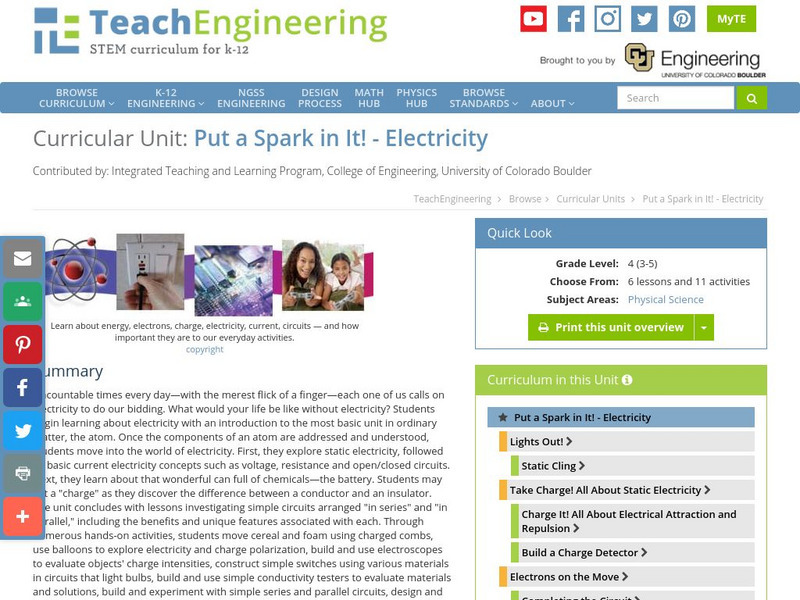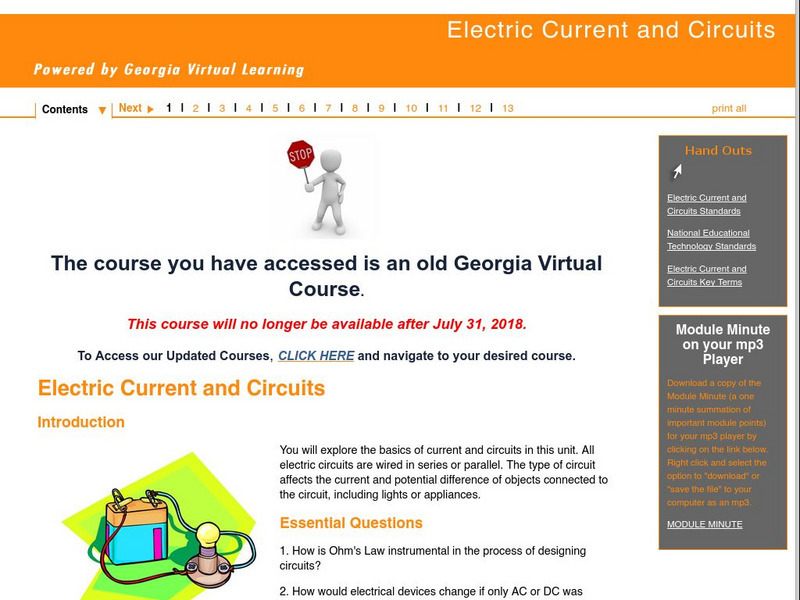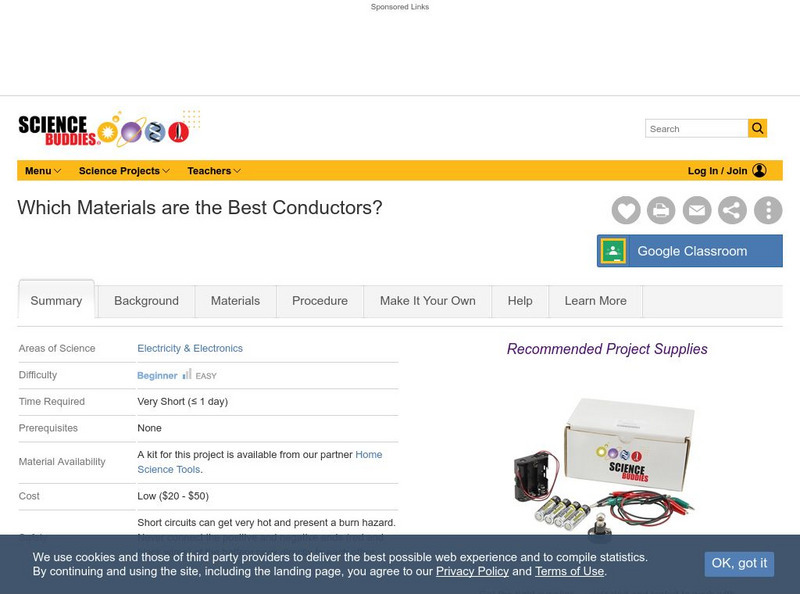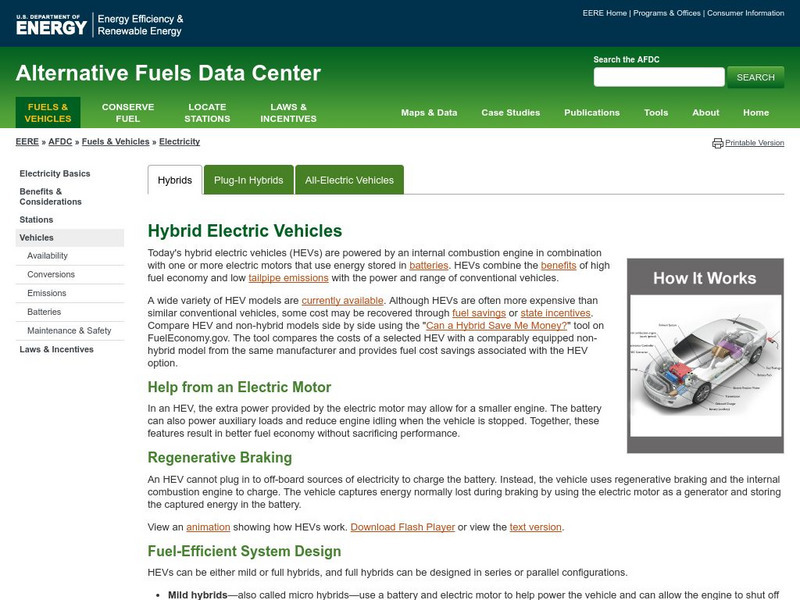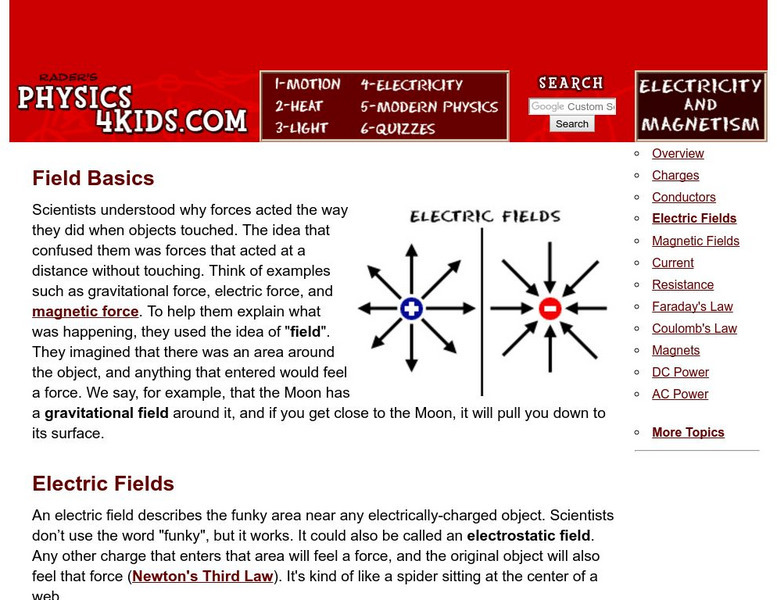Cosmo Learning
Cosmo Learning: Basic Electrical Technology
A collection of video lectures from a course introducing students to the basic concepts of electrical technology. Webpage includes thirty-nine lectures from a professor at the National Programme on Technology Enhanced Learning. Lectures...
Khan Academy
Khan Academy: Basic Electrical Quantities: Current, Voltage, Power
Build an intuitive understanding of current and voltage, and power.
Science Education Resource Center at Carleton College
Serc: Lighting the Way: Electrical Circuits and Lamp Wiring
Through a series of self-guided activities, students will explore basic electrical circuits and then build a working model of a circuit through the process of wiring a lamp. They will understand the flow of electrons through a circuit,...
TeachEngineering
Teach Engineering: Put a Spark in It! Electricity
Uncountable times every day "with the merest flick of a finger"each one of us calls on electricity to do our bidding. What would your life be like without electricity? Students begin learning about electricity with an introduction to the...
National High Magnetic Field Laboratory
Magnet Academy: Simple Electrical Cell
This is a Java tutorial showing the simple voltaic (or galvanic) electrical cell, which is the most basic type of "wet" cell and demonstrates the fundamental chemistry behind batteries.
Khan Academy
Khan Academy: Electrical Engineering: Introduction
Some basic concepts to introduce the electrical engineering course. Become familiar with engineering numbers and notation, and learn about the two most important electrical quantities: current and voltage.
US Energy Information Administration
U.s. Eia Energy Kids: Energy Sources: Electricity
A basic description of electricity and the role it plays in everyday life.
Khan Academy
Khan Academy: Electrical Engineering: Circuit Analysis
Circuit analysis is the process of finding all the currents and voltages in a network of connected components. We look at the basic elements used to build circuits, and find out what happens when elements are connected together into a...
Georgia Department of Education
Ga Virtual Learning: Electric Current and Circuits
Students have the opportunity to explore the basics of current and circuits in this online module. Some of the activities include interactive animations, informational text, practice problems, and lab experiments.
TeachEngineering
Teach Engineering: From Sunlight to Electric Current
The lesson will first explore the concept of current in electrical circuits. Current will be defined as the flow of electrons. Photovoltaic (PV) cell properties will then be introduced. This will lead to the principle of "Conservation of...
State Energy Conservation Office-Texas
State Energy Conservation Office: Wind Power Basics [Pdf]
A mini-unit on wind energy. Students first read a passage about wind energy, and respond to comprehension questions. They then do a lab activity where they build and test a windmill to see how design and placement of the windmill affect...
TeachEngineering
Teach Engineering: The Electric and Magnetic Personalities of Mr. Maxwell
Students are briefly introduced to Maxwell's equations and their significance to phenomena associated with electricity and magnetism. Basic concepts such as current, electricity and field lines are covered and reinforced. Through...
US Energy Information Administration
U.s. Eia Energy Kids: Electricity Basics
Find out about the usage of electricity. and how it affects modern energy use.
Khan Academy
Khan Academy: Electrical Engineering: Amplifiers
Amplifiers make signals bigger. Amplification is often the most basic operation of an electronic circuit. There are many kinds of amplifier designs. We will describe the operational amplifier, the building block of most analog electronics.
Science Buddies
Science Buddies: Which Materials Are the Best Conductors?
There are two main types of materials when it comes to electricity, conductors, and insulators. What are they made of? Find out by testing different materials in a circuit to see which ones conduct the most electricity.
Science Buddies
Science Buddies: Project Ideas: Which Materials Are the Best Conductors?
A simple science fair project to test whether electricity can flow between two things. The Science Buddies project ideas are set up consistently beginning with an abstract, objective, and introduction, followed by a section on terms,...
US Department of Energy
U.s. Department of Energy: Energy Basics: Hybrid Electric Vehicles
Brief illustrated explanation of how hybrid electric vehicles (HEVs) work.
US Department of Energy
U.s. Department of Energy: Energy Basics: Renewable Energy: Biomass
Find out about the renewable energy resource using biomass technologies. Learn about the three main types of biomass and how the stored energy from the sun is captured for use.
US Department of Energy
U.s. Department of Energy: Energy Basics: Renewable Energy: Geothermal
Find out about renewable energy resources using geothermal technologies as the source. Learn how scientists have discovered how to utilize sustainable heat from the Earth using several methods.
Physics Classroom
The Physics Classroom: Static Electricity: Neutral vs. Charged Objects
With this interactive tutorial, students explore the basic terminology and concepts of neutral and charged objects.
Smithsonian Institution
National Museum of American History: Fuel Cell Basics
Presents a general overview of fuel cells including what is a fuel cell, how do they work, and the different types.
TeachEngineering
Teach Engineering: How Does a Robot Work?
This lesson introduces electricity, batteries and motors using a LEGO MINDSTORMS NXT robot. The associated activity guides young scholars to build a simple LEGO NXT set-up and see the practical implementation of the concepts discussed....
Physics4kids
Physics4 Kids: Electrical Field Basics
This resource explains how an electrical field is created and the criteria that determines its' strength. Other topics briefly addressed include capacitors and the work of Michael Faraday.
Ducksters
Ducksters: Kids Science: Electricity 101
Kid's learn about the basic science of electricity. What is it and how it works.
Other popular searches
- Basic Electricity Worksheets
- Basic Electricity Free
- Basic Electricity Buzzer
- Basic Electricity Circuits
- Basic Electricity and Circuits
- Basic Electricity + Free
- Basic Electricity \ Free





